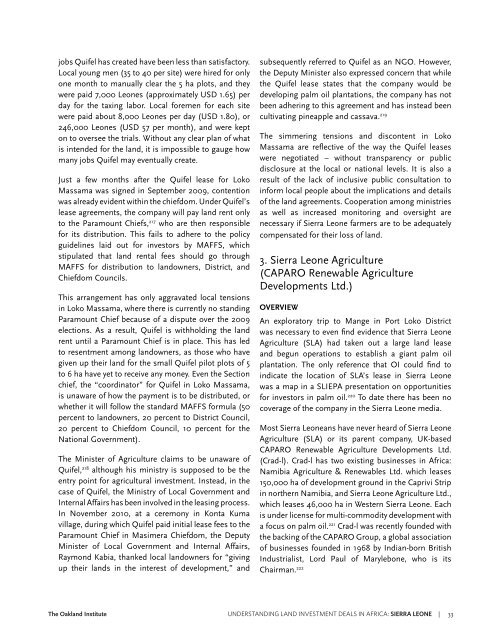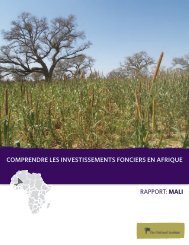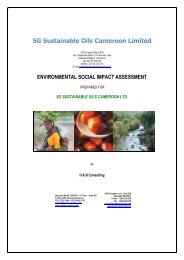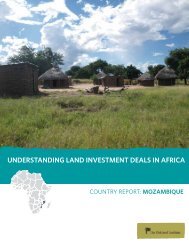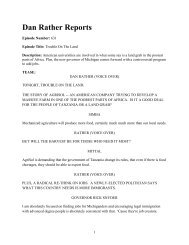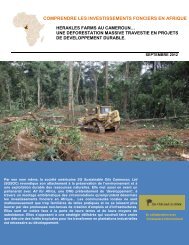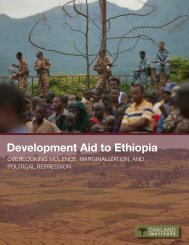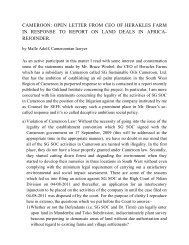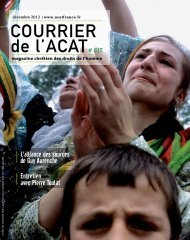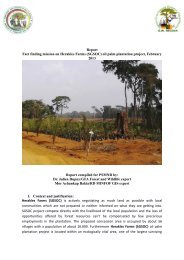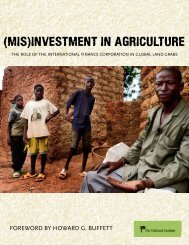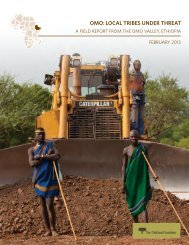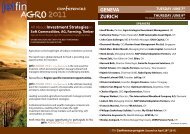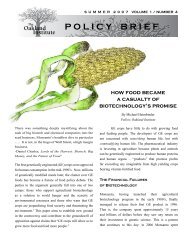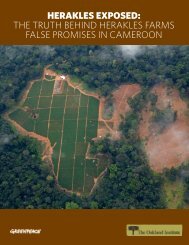Country Report: Sierra Leone - Oakland Institute
Country Report: Sierra Leone - Oakland Institute
Country Report: Sierra Leone - Oakland Institute
Create successful ePaper yourself
Turn your PDF publications into a flip-book with our unique Google optimized e-Paper software.
jobs Quifel has created have been less than satisfactory.<br />
Local young men (35 to 40 per site) were hired for only<br />
one month to manually clear the 5 ha plots, and they<br />
were paid 7,000 <strong>Leone</strong>s (approximately USD 1.65) per<br />
day for the taxing labor. Local foremen for each site<br />
were paid about 8,000 <strong>Leone</strong>s per day (USD 1.80), or<br />
246,000 <strong>Leone</strong>s (USD 57 per month), and were kept<br />
on to oversee the trials. Without any clear plan of what<br />
is intended for the land, it is impossible to gauge how<br />
many jobs Quifel may eventually create.<br />
Just a few months after the Quifel lease for Loko<br />
Massama was signed in September 2009, contention<br />
was already evident within the chiefdom. Under Quifel’s<br />
lease agreements, the company will pay land rent only<br />
to the Paramount Chiefs, 217 who are then responsible<br />
for its distribution. This fails to adhere to the policy<br />
guidelines laid out for investors by MAFFS, which<br />
stipulated that land rental fees should go through<br />
MAFFS for distribution to landowners, District, and<br />
Chiefdom Councils.<br />
This arrangement has only aggravated local tensions<br />
in Loko Massama, where there is currently no standing<br />
Paramount Chief because of a dispute over the 2009<br />
elections. As a result, Quifel is withholding the land<br />
rent until a Paramount Chief is in place. This has led<br />
to resentment among landowners, as those who have<br />
given up their land for the small Quifel pilot plots of 5<br />
to 6 ha have yet to receive any money. Even the Section<br />
chief, the “coordinator” for Quifel in Loko Massama,<br />
is unaware of how the payment is to be distributed, or<br />
whether it will follow the standard MAFFS formula (50<br />
percent to landowners, 20 percent to District Council,<br />
20 percent to Chiefdom Council, 10 percent for the<br />
National Government).<br />
The Minister of Agriculture claims to be unaware of<br />
Quifel, 218 although his ministry is supposed to be the<br />
entry point for agricultural investment. Instead, in the<br />
case of Quifel, the Ministry of Local Government and<br />
Internal Affairs has been involved in the leasing process.<br />
In November 2010, at a ceremony in Konta Kuma<br />
village, during which Quifel paid initial lease fees to the<br />
Paramount Chief in Masimera Chiefdom, the Deputy<br />
Minister of Local Government and Internal Affairs,<br />
Raymond Kabia, thanked local landowners for “giving<br />
up their lands in the interest of development,” and<br />
subsequently referred to Quifel as an NGO. However,<br />
the Deputy Minister also expressed concern that while<br />
the Quifel lease states that the company would be<br />
developing palm oil plantations, the company has not<br />
been adhering to this agreement and has instead been<br />
cultivating pineapple and cassava. 219<br />
The simmering tensions and discontent in Loko<br />
Massama are reflective of the way the Quifel leases<br />
were negotiated – without transparency or public<br />
disclosure at the local or national levels. It is also a<br />
result of the lack of inclusive public consultation to<br />
inform local people about the implications and details<br />
of the land agreements. Cooperation among ministries<br />
as well as increased monitoring and oversight are<br />
necessary if <strong>Sierra</strong> <strong>Leone</strong> farmers are to be adequately<br />
compensated for their loss of land.<br />
3. <strong>Sierra</strong> <strong>Leone</strong> Agriculture<br />
(CAPARO Renewable Agriculture<br />
Developments Ltd.)<br />
OvERvIEw<br />
An exploratory trip to Mange in Port Loko District<br />
was necessary to even find evidence that <strong>Sierra</strong> <strong>Leone</strong><br />
Agriculture (SLA) had taken out a large land lease<br />
and begun operations to establish a giant palm oil<br />
plantation. The only reference that OI could find to<br />
indicate the location of SLA’s lease in <strong>Sierra</strong> <strong>Leone</strong><br />
was a map in a SLIEPA presentation on opportunities<br />
for investors in palm oil. 220 To date there has been no<br />
coverage of the company in the <strong>Sierra</strong> <strong>Leone</strong> media.<br />
Most <strong>Sierra</strong> <strong>Leone</strong>ans have never heard of <strong>Sierra</strong> <strong>Leone</strong><br />
Agriculture (SLA) or its parent company, UK-based<br />
CAPARO Renewable Agriculture Developments Ltd.<br />
(Crad-l). Crad-l has two existing businesses in Africa:<br />
Namibia Agriculture & Renewables Ltd. which leases<br />
150,000 ha of development ground in the Caprivi Strip<br />
in northern Namibia, and <strong>Sierra</strong> <strong>Leone</strong> Agriculture Ltd.,<br />
which leases 46,000 ha in Western <strong>Sierra</strong> <strong>Leone</strong>. Each<br />
is under license for multi-commodity development with<br />
a focus on palm oil. 221 Crad-l was recently founded with<br />
the backing of the CAPARO Group, a global association<br />
of businesses founded in 1968 by Indian-born British<br />
Industrialist, Lord Paul of Marylebone, who is its<br />
Chairman. 222<br />
The <strong>Oakland</strong> <strong>Institute</strong> understanding land investment deals in afriCa: sierra <strong>Leone</strong> | 33


